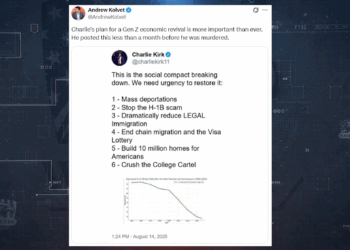Utah’s state-backed mental health initiatives, combined with online platforms like Roblox, are at the center of controversy following the alleged shooter in Charlie Kirk’s assassination.
On Monday’s WarRoom, Sheila Matthews and Steve Bannon argue these programs, including AI-driven therapy, may have failed to protect vulnerable youth, while implicating the shooter’s mother—an employee of Governor Cox’s administration—in oversight gaps. They call for accountability, transparency, and a public reckoning over state policies, parental authority, and ideological influence in youth mental health and education.
Quick Clip:
SHEILA MATTHEWS: Dr. James Ashworth built "Love Your Mind World" on Roblox, aimed at youth, offering anonymous "therapy” inside the gaming platform.
Governor Cox pushed this initiative as policy, but parents have no idea who’s behind it, what data is collected, or how… pic.twitter.com/xbNhhQ0sui
— Bannon’s WarRoom (@Bannons_WarRoom) September 15, 2025
During their conversation, Bannon opened by emphasizing the lack of a clear, organized narrative in the aftermath of the assassination. Matthews, who has been investigating state mental health programs, stressed the critical role of Amber Robinson, the mother of the alleged shooter and a behavioral health coordinator in Governor Cox’s administration. According to Matthews, this connection raises urgent questions about conflict of interest, oversight, and accountability.
Central to the discussion is Utah’s online mental health initiative, "Love Your Mind World,” created by Dr. James Ashford of the Huntsman Institute. Hosted on Roblox, the program provides AI-driven therapy to children, including members of the LGBTQ+ community. Bannon and Matthews highlighted serious concerns: anonymity, consent, the use of algorithms instead of licensed therapists, and insufficient transparency regarding who is administering these programs. They argue that such initiatives, sanctioned and funded by the state, may unintentionally expose children to ideological influence or insufficiently monitored mental health care.
Bannon emphasized the intersection of these programs with broader policies, including Social Emotional Learning (SEL) and what he terms the "empathy crisis.” He noted that initiatives supported by figures like Abby Cox—Governor Cox’s wife—are funded by foundations such as Rockefeller and are pushing state-endorsed SEL programs in schools. Bannon argues these programs manipulate children’s emotional and ideological development, reducing parental authority and creating long-term cultural and political impacts.
Matthews and Bannon also discussed Roblox as a platform. Beyond therapy, it allegedly hosts games depicting acts of violence, including dramatizations of Charlie Kirk’s assassination. The presence of such content raises questions about monitoring, content moderation, and the state’s role in approving programs that may intersect with youth exposure to violent simulations.
In addition to the platform and policy concerns, Bannon and Matthews highlighted systemic failures. They argue the state has provided insufficient transparency on mental health initiatives, the mother’s involvement, and the policies guiding AI therapy. This failure to disclose critical details, they assert, exacerbates risks to children, creates conflicts of interest, and erodes public trust.
The conversation concluded with a call to action: parents must be vigilant, demand accountability from state leaders, and actively monitor programs affecting children’s emotional and mental development. Bannon and Matthews stress that Governor Cox and his administration bear direct responsibility for programs under their oversight, and public pressure is necessary to ensure transparency, protect youth, and restore trust in state-backed mental health initiatives.
Bottom line: Utah’s mental health programs, combined with AI therapy on platforms like Roblox, are entangled in controversy surrounding the alleged shooter in Charlie Kirk’s assassination. The involvement of the mother as a state employee, gaps in oversight, and broader SEL and empathy initiatives raise urgent questions about accountability, consent, and ideological influence on vulnerable youth. The conversation underscores the need for immediate public scrutiny and reform.
For more context, watch this full segment featuring Shelia Matthews:





